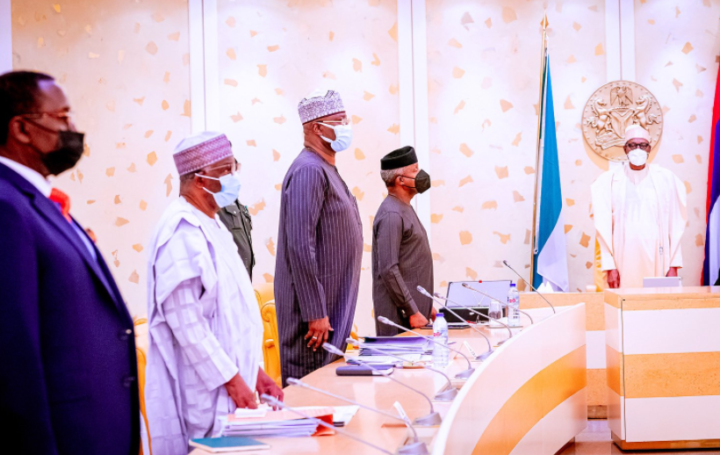President of the Ahmad Lawan, senate president; President Muhammadu Buhari, Vice President Yemi Osinbajo and Femi Gbajabiamila, speaker of house of representatives during the presentation of 77th birthday card
There is hardly a week at the national assembly without news of government ministries, departments and agencies (MDAs) failing to obey summons issued by committees of the senate and house of representatives. Outsiders would think the lawmakers are not empowered by law to issue such summons, hence the usual disobedience. But that is far from the case.
The 1999 constitution provides for such powers for the lawmakers “to expose corruption, inefficiency or waste in the execution or administration of laws within its legislative competence and in the disbursement or administration of funds appropriated by it”.
To do this successfully, section 89 (1c) states they have the power to “summon any person in Nigeria to give evidence at any place or produce any document or other thing in his possession or under his control, and examine him as a witness and require him to produce any document or other thing in his possession or under his control, subject to all just exceptions”.
WHY THEN ARE THESE SUMMONS USUALLY DISOBEYED?
Advertisement
Checks by TheCable revealed that notwithstanding the power to summon, the constitution is silent on what happens to the person being summoned if they continue to disobey — even when a warrant is issued against them.
Section 89 (1d), which provides for such warrant, states that the lawmakers can “issue a warrant to compel the attendance of any person who, after having been summoned to attend, fails, refuses or neglects to do so and does not excuse such failure, refusal or neglect to the satisfaction of the House or the committee in question”.
In instances where such warrants do not see the light of the day, as is often the case, the section only mandates the national assembly to “order him (the person summoned) to pay all costs which may have been occasioned” in the course of issuing the summons and “any fine so imposed shall be recoverable in the same manner as a fine imposed by a court of law.”
Advertisement
However, in recent months, the national assembly has appeared to be helpless as a result of the repeated refusal of heads of MDAs to comply with its summons.
Last week, four key government officials including Godwin Emefiele, governor of the Central Bank of Nigeria (CBN), Babagana Monguno, national security adviser; Usman Baba, inspector-general of police, and Basir Jamoh, director-general of the Nigerian Maritime Administration and Safety Agency (NIMASA) refused to obey summons by a house of representatives ad hoc committee. And, as expected, the lawmakers could not go beyond threatening to issue a warrant against them.
Once, Femi Gbajabiamila, the speaker, said he will report service chiefs to President Muhammadu Buhari after they did not obey an invitation.
Some have argued that the trend is due, in part, to the absence of a clear penalty provided by the law while others believe it is buoyed by the close relationship the presidency enjoys with the national assembly leaders.
Advertisement
Spokespersons of both the speaker and senate president have not responded to an enquiry to speak on the matter. But Inibehe Effiong, a constitutional lawyer, told TheCable that the national assembly is only playing to the gallery regarding summons, and that the lawmakers “have not shown seriousness” in invoking their constitutional powers in most cases.
“In most instances, the lawmakers themselves are not serious because if they are serious, they will insist on compliance issued by them. When they issue summons and the person summoned do not appear, more often than not, they engage in making a paper threat,” he said.
“Let it be that they have issued the summons and the police refuse to execute it, we would now hold the police responsible. But in how many of these cases have warrants been issued? So even when these heads of agencies disregard their summons, they just rant about it in the press; they don’t do anything beyond that.”
‘LEGISLATURE-EXECUTIVE FRIENDSHIP IS ANOTHER REASON’
Advertisement
Nkem Abonta, a member of the house of representatives admitted that the legislature-executive friendship and political affiliation makes some members of the executive disregard summons, but added that such rapport should not be a basis to disregard the invitations.
“This legislative-executive friendship is also responsible for the flagrant refusal to appear before the legislators,” he told TheCable, but added that he is advocating that “every arm should still remain firm” even with such a relationship.
Advertisement
He continued: “We see more of it now because they believe we have legislative-executive rapport. That rapport seems to be weighing down our will to do the needful. Too, I may also call it political affiliation and party sentiment could also be responsible for the problem.
“The problem with the implementation of executive oversight or investigation or what I may call executive rascality is not because of the absence of laws, the laws are sufficient to ensure compliance when the legislators invite or summon the MDAs and their big chiefs, but due to such executive believing that legislators may not do much or the willingness of the legislators to carry the laws to its latter is also responsible.
Advertisement
IMPLICATION FOR ACCOUNTABILITY
Apart from lawmaking, an important function of the national assembly is to check on the excesses of the executive and ensure that heads of MDAs efficiently implement the programmes of government following due process.
Advertisement
But there have been instances where the office of the auditor-general of the federation (AuGF) has written to the national assembly, asking them to probe some MDAs over some issues of concern. But such a probe is sometimes not effective when launched often because the government officials summoned never show up at the lawmakers’ meetings.
“If we have men of integrity appointed into these ministries and placed in strategic positions, they will be able to effect changes that will block these leakages that we see so vividly across our country,” Prince Chimaroke, communications lead at Accountability Lab, said.
“Beyond summoning, it is for the government to change the strategy when it comes to the appointment of people to lead these ministries. The ones who even manage to obey the summons will end up passing out, or pretending to pass out; so many funny things happening.”
WHAT IS THE WAY FORWARD?
As a step to correct the loophole in the constitution, the national assembly is currently seeking to amend section 89 (1d) through a bill that had passed the second reading at the house of representatives in October 2020.
The bill provides a new section which reads: “Notwithstanding anything to the contrary in this constitution, any person who after having summoned to attend, fails, refuses, or neglects to do so and does not excuse such failure, refusal or neglect to the satisfaction of the legislative house or committee in question, commits an offence and his liable on conviction to such punishment as shall be prescribed by an act of the National Assembly.”
In punishing such person, the bill empowers the lawmakers to invoke section 14 (3) of the legislative houses (powers and privileges) act of 2017, which states that “a person who commits a contempt of the legislative house, under this subsection 12 of this act, is liable on conviction to a fine of N500,000 or imprisonment for a term of two years or both”.
But, beyond that, Abonta argues that lawmakers must also have the political will to demand the resignation of political appointees when they disregard summons.
“We do not have the will to demand their resignation or their sack. So, we should pick courage. If you have a minister who refuses to come, you place a call on the executive who appointed him to relieve him of the job and appoint others would take such an appointment seriously,” he said, adding that, ”legislators need to be more pragmatic and independent-minded.”
Add a comment






